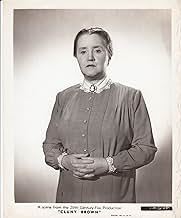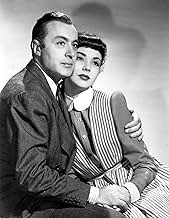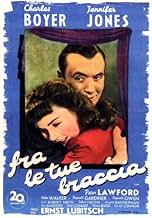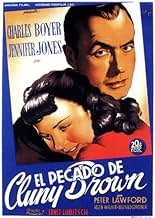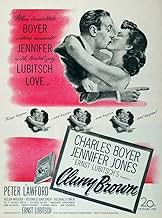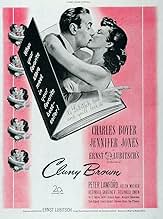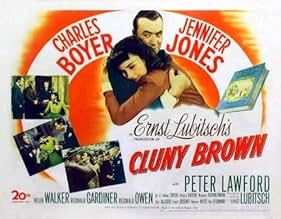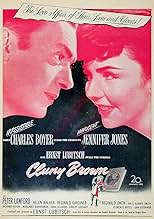IMDb RATING
7.4/10
4.4K
YOUR RATING
A free-spirited parlor maid and a Czech refugee surprise an English village with their unconventional ways.A free-spirited parlor maid and a Czech refugee surprise an English village with their unconventional ways.A free-spirited parlor maid and a Czech refugee surprise an English village with their unconventional ways.
- Awards
- 3 wins total
C. Aubrey Smith
- Col. Charles Duff Graham
- (as Sir C. Aubrey Smith)
Norman Ainsley
- Mr. Tupham
- (uncredited)
Billy Bevan
- Uncle Arn Porritt
- (uncredited)
Whit Bissell
- Archie
- (uncredited)
Bette Rae Brown
- Girl at Party
- (uncredited)
Charles Coleman
- Constable Birkins
- (uncredited)
Featured reviews
The Lubitsch Touch is evident in this witty, intelligent film. Jennifer Jones shows a vivacity and humor she had never displayed before and would not again until her clever performance in "Beat The Devil". In one amazing scene where she cannot resist showing her wares as a Plumber (to the disdain of the other party guests) she gets to play a reaction to the debacle that is amazing in its combination of pathos and hilarity. Very interesting character actors including a very, very funny Una O'Connor (whose dialogue consists mainly of incessantly clearing her throat), the light as a feather and dead on playing of Margaret Bannerman, and also a chance to see Helen Walker. Charles Boyer plays with his customary light touch and is the anchor to this film, but finally it is Jennifer Jones' performance that takes one breath away and stays with you long after you've seen it.
Have seen this more than once on TV (though not for quite a few years now) and I'd be first in line if Fox Classics were to issue it on video. It's a slight bit of fluff, given the full Twentieth gloss, and elevated to sublimely sly tongue-in-cheek humor, courtesy of Herr Lubitsch. Everyone in the cast is in top form (Thank goodness David O. Selznick was willing to loan his treasure, Jennifer Jones, to Fox...She's a delight in this one!) Standouts are Sara Allgood as the mansion's oh-so-proper head housekeeper and Richard Haydn as the hilariously stuffy Mr. Wilson, Cluny's would-be suitor. The final shot of Jennifer falling in a dead faint (due to her impending, but not yet obvious maternity) seen through a 5th Avenue bookstore window, is one of the best curtains in screen annals!
Cluny Brown (1946)
"It's never too late for a cat." And this is the essence of the movie, a supposed satire on British manners pre-WWII, but more likely just a bit of delightful nonsense. The star for me is the delectable Jennifer Jones who is more than just a pretty decoration-she gives her role as a uninhibitted working class woman a kind of Audrey Hepburn freshness. Before Audrey Hepburn.
Charles Boyer is no doubt the most esteemed star here, but he's his usual self with a bit of forced charm. Director Lubitsch makes the whole scene quite delicious, so it's the big view that makes the small pieces click. (And this is what he is famous for, setting the European scene with a subtle, sharp eye.) There is humor here (it's a comedy, yes) but there is a kind of elegand disdain that is something more than that.
And it's beautifully filmed, by young (great) cinematographer Joe LaShelle.
What holds it all back for me is the writing, which is a kind of forced comedy, creating situations that are "made" for comedy. An awkward confrontation, an improbable entry of one character into another character's world. There is whispering and disbelief and nonchalance all mixed together in a way that is, in fact, lighthearted, but isn't as funny or bright as you would want.
And so the movie zips on, quite fun and lighthearted but always (for me) missing some basic gut humor or even a more trenchant critique of its subject, the British upper class. I did, I have to admit, love the ending, which was perhaps inevitable, but which pulled of a clever telling of the future of the leading characters. Fun, well done! And Jones is sublime even when she's goofy.
"It's never too late for a cat." And this is the essence of the movie, a supposed satire on British manners pre-WWII, but more likely just a bit of delightful nonsense. The star for me is the delectable Jennifer Jones who is more than just a pretty decoration-she gives her role as a uninhibitted working class woman a kind of Audrey Hepburn freshness. Before Audrey Hepburn.
Charles Boyer is no doubt the most esteemed star here, but he's his usual self with a bit of forced charm. Director Lubitsch makes the whole scene quite delicious, so it's the big view that makes the small pieces click. (And this is what he is famous for, setting the European scene with a subtle, sharp eye.) There is humor here (it's a comedy, yes) but there is a kind of elegand disdain that is something more than that.
And it's beautifully filmed, by young (great) cinematographer Joe LaShelle.
What holds it all back for me is the writing, which is a kind of forced comedy, creating situations that are "made" for comedy. An awkward confrontation, an improbable entry of one character into another character's world. There is whispering and disbelief and nonchalance all mixed together in a way that is, in fact, lighthearted, but isn't as funny or bright as you would want.
And so the movie zips on, quite fun and lighthearted but always (for me) missing some basic gut humor or even a more trenchant critique of its subject, the British upper class. I did, I have to admit, love the ending, which was perhaps inevitable, but which pulled of a clever telling of the future of the leading characters. Fun, well done! And Jones is sublime even when she's goofy.
I loved this movie. Charles Boyer is always such a smooth actor. Im a sucker for a French accent. It was simple movie with a simple plot. Jennifer Jones was cute in the movie but not the best acting I've seen her do. I really liked her character though. I've watched this movie about 15 times and I cant really explain why, except that it makes me feel good. This is the kind of movie you want to watch if its a rainy, cold day outside and you can curl up with a cup of cocoa. The cocoa will warm your insides and the movie Cluny Brown will warm your heart. I will always treasure this sweet simple romantic comedy. Keep in mind that this is a very old movie and the purpose was for entertainment back then, not detailed plot twists. I think that this movie is worth watching, but don't stop after the first 15 minutes, it does get better. Just watch it!!!Trust me!!
This is a very clever, witty, wacky, screwball, satire comedy of people, place and manners. From its source to the script, acting and production, "Cluny Brown" is a masterpiece of film comedy. This is one of the cleverest, funniest and most entertaining movies I've ever seen. The script is witty, filled with hilarious dialog, and sprinkled with frequent clever sidesteps and detours. Such would normally make a film disjointed and hard to follow. But here the short distractions work beautifully to make it like a screwball comedy. All of this makes for a very funny, wacky and subtly satirical film.
The film begins in London in June of 1938. World War II had not yet begun. The book on which the film is based, was a 1944 novel of the same title. The world was deeply into the war when Margery Sharp wrote the novel, but the outcome was far from certain. Yet, the war was well over by the summer of 1946 when this film came out. Part of the spoofery of the film is of the ignorance about the world scene among some of the upper peerage of England.
Ernst Lubitsch directed some of the best political satire films, and this was the last movie he completed before his death in 1947 of a heart attack at age 55. Besides a great plot and excellent screenplay, this film has a marvelous cast. The acting is superb from the leads down to the smallest of roles. The supporting cast reads like a who's who of U.K. actors of the day.
The script is so chock-full of humor that this film needs a second, third and even fourth viewing. It gets better each time as one notices more of the short retorts, smart snippets and wacky lines. Many of the cast were worthy of Oscar nominations in 1946. But it was a year of many great films, most of which were serious fare in the aftermath of war. Still, "Cluny Brown" was a hit on both sides of the pond. Had it been made three or four years later, it surely would have captured some major awards.
As Cluny, Jennifer Jones shows her aptitude for comedy as well as drama. She was nominated for an Oscar in another film of 1946, the Western drama, "Duel in the Sun." She won an Oscar and Golden Globe for "The Song of Bernadette" in 1943. Jones clearly is one of the great actresses of the silver screen.
Cluny's fixation for plumbing is matched by Adam Belinski's observance of the squirrels and nuts in Hyde Park. Charles Boyer is at his comedic best as the Czech writer who fled his native Budapest ahead of the Nazis.
Each one of the rest of the cast who play English lords, ladies, servants and tradesmen, is ideal in his or her role. Reginald Owen is hilarious as Sir Henry Carmel. Margaret Bannerman has a role much like one that Billie Burke often played. She is something of a dingbat with moments of clarity. Peter Lawford is very funny as Andrew Carmel, and Helen Walker is a scream as Betty Cream. The pretentious Andrew can't stand the pretentious Cream, but he pines for her constantly. Richard Haydn is howlingly funny as the snobbish chemist (we Yanks would call him a druggist), Jonathan Wilson. Una O'Connor was never funnier, without saying a single word. The servants of the Carmels are a hoot, and Reginald Gardiner, Billy Bevan and all the rest provide shots of humor.
Author Margery Sharp (1905-1991) was a sort of Jane Austen of the 20th century. With more than two dozen novels and many short stories and plays to her credit, she was well known. A number of her stories have been put on film. "Julia Misbehaves" of 1948 is another great comedy with Greer Garson, Walter Pidgeon, and Cesar Romero.
Here are some favorite lines from this film. For more great dialog, see the Quotes section under this IMDb Web page of the movie.
Hilary Ames, "If plumbing's going to make a go of it in this country, the plumbers jolly well better get into the spirit of the thing."
Andrew Carmel, "Good heavens." Betty Cream, "What's the matter?" Andrew, "It's Belinski." ... Betty, "Is he a gangster?" Andrew, "Don't be an idiot, Betty. He's a Czech."
Sir Henry Carmel, "You mean to tell me young girls go in for plumbing nowadays?... When I was a young man, we never even discussed plumbing. As a matter of fact, we didn't have any."
Lady Alice Carmel, "If England must produce Belinskis, why we will produce Belinskis. Britain has never failed. Now have your tea, dear."
Andrew Carmel, "Oh, you can't call a man broke just because he hasn't any money."
Lady Alice Carmel, "So many foreigners do have foreign names, don't they?"
Syrette, "What do you expect? Maid without references, and a foreigner who isn't even in the diplomatic service."
Cluny Brown, "Poor little sheep. It hasn't much future, has it? Just mutton." Jonathan Wilson, "And where would England be without it? If I was a sheep, I should be proud to serve the empire."
Jonathan Wilson, "Mother doesn't waste words on flattery. If she speaks, it's to correct faults."
Adam Belinski, "No, Sir Henry. I know Hitler." Sir Henry Carmel, "Oh, yes, he's written a book, hasn't he?... What's it called? Oh, yes, "My Camp." Belinski, "Yes, it's a kind of outdoor book. The old German idea of sport. Not your kind of sport.
Syrette, "I shall never forget the day she dusted the left eye out of Sir Henry's moose."
Cluny Brown, "You know, Mr. Belinski, men just don't marry plumbers."
Cluny Brown, "He told me what he thought of me. Some of it was in Latin."
The film begins in London in June of 1938. World War II had not yet begun. The book on which the film is based, was a 1944 novel of the same title. The world was deeply into the war when Margery Sharp wrote the novel, but the outcome was far from certain. Yet, the war was well over by the summer of 1946 when this film came out. Part of the spoofery of the film is of the ignorance about the world scene among some of the upper peerage of England.
Ernst Lubitsch directed some of the best political satire films, and this was the last movie he completed before his death in 1947 of a heart attack at age 55. Besides a great plot and excellent screenplay, this film has a marvelous cast. The acting is superb from the leads down to the smallest of roles. The supporting cast reads like a who's who of U.K. actors of the day.
The script is so chock-full of humor that this film needs a second, third and even fourth viewing. It gets better each time as one notices more of the short retorts, smart snippets and wacky lines. Many of the cast were worthy of Oscar nominations in 1946. But it was a year of many great films, most of which were serious fare in the aftermath of war. Still, "Cluny Brown" was a hit on both sides of the pond. Had it been made three or four years later, it surely would have captured some major awards.
As Cluny, Jennifer Jones shows her aptitude for comedy as well as drama. She was nominated for an Oscar in another film of 1946, the Western drama, "Duel in the Sun." She won an Oscar and Golden Globe for "The Song of Bernadette" in 1943. Jones clearly is one of the great actresses of the silver screen.
Cluny's fixation for plumbing is matched by Adam Belinski's observance of the squirrels and nuts in Hyde Park. Charles Boyer is at his comedic best as the Czech writer who fled his native Budapest ahead of the Nazis.
Each one of the rest of the cast who play English lords, ladies, servants and tradesmen, is ideal in his or her role. Reginald Owen is hilarious as Sir Henry Carmel. Margaret Bannerman has a role much like one that Billie Burke often played. She is something of a dingbat with moments of clarity. Peter Lawford is very funny as Andrew Carmel, and Helen Walker is a scream as Betty Cream. The pretentious Andrew can't stand the pretentious Cream, but he pines for her constantly. Richard Haydn is howlingly funny as the snobbish chemist (we Yanks would call him a druggist), Jonathan Wilson. Una O'Connor was never funnier, without saying a single word. The servants of the Carmels are a hoot, and Reginald Gardiner, Billy Bevan and all the rest provide shots of humor.
Author Margery Sharp (1905-1991) was a sort of Jane Austen of the 20th century. With more than two dozen novels and many short stories and plays to her credit, she was well known. A number of her stories have been put on film. "Julia Misbehaves" of 1948 is another great comedy with Greer Garson, Walter Pidgeon, and Cesar Romero.
Here are some favorite lines from this film. For more great dialog, see the Quotes section under this IMDb Web page of the movie.
Hilary Ames, "If plumbing's going to make a go of it in this country, the plumbers jolly well better get into the spirit of the thing."
Andrew Carmel, "Good heavens." Betty Cream, "What's the matter?" Andrew, "It's Belinski." ... Betty, "Is he a gangster?" Andrew, "Don't be an idiot, Betty. He's a Czech."
Sir Henry Carmel, "You mean to tell me young girls go in for plumbing nowadays?... When I was a young man, we never even discussed plumbing. As a matter of fact, we didn't have any."
Lady Alice Carmel, "If England must produce Belinskis, why we will produce Belinskis. Britain has never failed. Now have your tea, dear."
Andrew Carmel, "Oh, you can't call a man broke just because he hasn't any money."
Lady Alice Carmel, "So many foreigners do have foreign names, don't they?"
Syrette, "What do you expect? Maid without references, and a foreigner who isn't even in the diplomatic service."
Cluny Brown, "Poor little sheep. It hasn't much future, has it? Just mutton." Jonathan Wilson, "And where would England be without it? If I was a sheep, I should be proud to serve the empire."
Jonathan Wilson, "Mother doesn't waste words on flattery. If she speaks, it's to correct faults."
Adam Belinski, "No, Sir Henry. I know Hitler." Sir Henry Carmel, "Oh, yes, he's written a book, hasn't he?... What's it called? Oh, yes, "My Camp." Belinski, "Yes, it's a kind of outdoor book. The old German idea of sport. Not your kind of sport.
Syrette, "I shall never forget the day she dusted the left eye out of Sir Henry's moose."
Cluny Brown, "You know, Mr. Belinski, men just don't marry plumbers."
Cluny Brown, "He told me what he thought of me. Some of it was in Latin."
Did you know
- TriviaThis was the last film director Ernst Lubitsch completed himself. He died the following year during the filming of La Dame au manteau d'hermine (1948).
- GoofsWhen Cluny and Adam and Hilary are in Hilary's living room, just after Cluny says "It's so wonderful to be a cat and read the Daily Mail," the boom mic can be seen in the mirror above Adam's head.
- Quotes
Adam Belinski: In Hyde Park, for instance, some people like to feed nuts to the squirrels. But if it makes you happy to feed squirrels to the nuts, who am I to say, "nuts to the squirrels?"
- ConnectionsEdited into I Love Lucy: The Fox Hunt (1956)
- How long is Cluny Brown?Powered by Alexa
Details
- Release date
- Country of origin
- Languages
- Also known as
- Cluny Brown
- Filming locations
- Production company
- See more company credits at IMDbPro
Box office
- Gross worldwide
- $17,155
- Runtime1 hour 40 minutes
- Color
- Aspect ratio
- 1.37 : 1
Contribute to this page
Suggest an edit or add missing content



